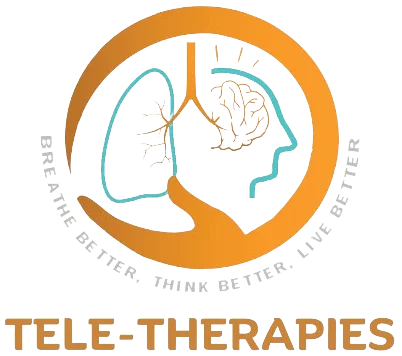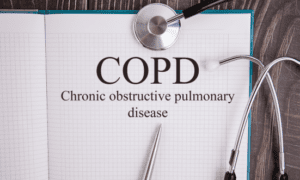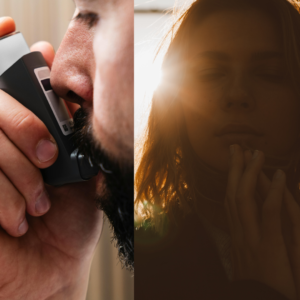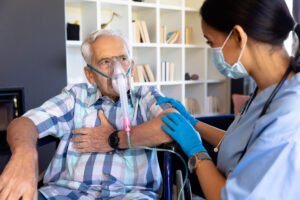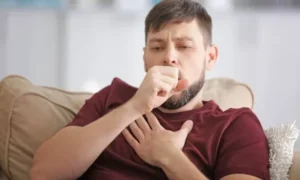Overview
Chronic obstructive pulmonary disease, or COPD, is an umbrella term that covers two diseases – emphysema and chronic bronchitis. The world health organisation (WHO) confirms chronic obstructive pulmonary disease (COPD) is the third leading cause of death worldwide, causing 3.23 million deaths in 2019.
According to US statistics, more than 30 million Americans have COPD. In the United Kingdom, COPD is the fifth biggest killer disease, killing approximately 25,000 people a year in England. The NHS Digital data shows that in 2020/21, approximately 1.17 million people in England have been diagnosed with COPD, which is around 1.9% of the population. The worst part is approximately half of these patients are not even aware of it.
Unfortunately, there is no cure for COPD, which leaves pulmonary rehabilitation as the only way to effectively manage this illness. In this article, we will cover the positive effects of pulmonary rehabilitation support for patient recovery in the management of chronic obstructive pulmonary disease (COPD).
What is pulmonary rehabilitation support?
The word “Pulmonary” is a scientific language is referred to our “Lung”. The world health organization (WHO) defines the term “Rehabilitation” is defined as “a set of interventions designed to optimize functioning and reduce disability in individuals with health conditions in interaction with their environment”. WHO statistic confirms “globally, an estimated 2.4 billion people are currently living with a health condition that benefits from rehabilitation.” “Rehabilitation is an essential part of universal health coverage along with promotion of good health, prevention of disease, treatment and palliative care.”
Pulmonary rehabilitation programme describes a biopsychosocial management plan that consists of education, exercises prescription, inhaler screening, oxygen prescription, counselling for mental health and further referral to specialist care for people with chronic lung disease. The goal of this therapy is to enable mechanical control of your respiratory system, which helps with the physiological symptoms of pulmonary diseases. For instance, dyspnea (i.e. shortness of breath) is extremely common in people with lung disease either chronic or acute. Being aware of your disease and lungs can help you reduce the frequency of your symptoms. Moreover, pulmonary exercises can aid with inhalation and exhalation, which are commonly challenging for people with pulmonary diseases.
Your therapist may also recommend the administration of oxygen, which is helpful in keeping your blood oxygen saturation elevated. Your pulmonary rehabilitation support may be administered by several healthcare professionals, including respiratory physiotherapist and nurse and exercise specialists. As it is biopsychosocial model other healthcare professional including respiratory consultant, psychologist or psychotherapist, occupational therapist, pharmacist, dietician and social workers play a major contribution to complete a tailored plan of biopsychosocial model.
How does pulmonary rehabilitation exercise prescription support aid with COPD
COPD has effects on the lung, peripheral muscles and cognitive functions resulting in anxiety and depression disorders resulting in poor quality of life and survival benefits. NHS England’s Five Year Forward View documents states two overarching priorities with regard to long term conditions and mental health, as set out in a publication from the Royal College of Psychiatrists. It is clearly stated in those documents that physical and mental healthcare provision should take place in the same setting and that mental healthcare provision should be integrated into existing medical pathways and services, be that primary or secondary care. If we could see the practical healthcare in the UK for COPD, we are failing to implement those statements of integrated physical and mental health care for patients with COPD.
However, the current focus of pulmonary rehabilitation for COPD in many settings is to support COPD patients through respiratory muscle training. The purpose of this training is to enhance abnormal breathing patterns. The latter can be the result of an increased work of breathing. Your therapist will also focus on chest wall changes and poor breathing habits.
Pulmonary rehabilitation support aids COPD patients through respiratory muscle training. The purpose of this training is to enhance abnormal breathing patterns. The latter can be the result of an increased work of breathing. Your therapist will also focus on chest wall changes and poor breathing habits.
The most common approach to achieve this goal is by including patients in endurance and strength training. By exercising regularly, you can increase a parameter called minute ventilation. Moreover, the constantly controlled movements of your upper and lower extremities can stimulate your respiratory muscles.
The result of this therapy is a normal breathing pattern that improves on a daily basis. Eventually, patients become more prepared for potential COPD exacerbations.
How does our practice Lung Rehab Voyage and Mind Vibes differ? We at Lung Rehab Voyage provide both respiratory physiotherapy and mental health therapy for patients with COPD.
Can you do pulmonary rehabilitation from home?
Pulmonary rehabilitation consists of several pillars of biopsychosocial model. You need the help of a professional to learn the theory and practical skills that make a session successful.
However, after going to several pulmonary rehabilitation sessions, you may be able to sustain the skill for life time management of your COPD condition. We recommend speaking with your doctor before attempting to perform these exercises.
Takeaway message
The evidence for the effectiveness of pulmonary rehabilitation support for patients with COPD is definitive. Scientists found that this therapy improves the quality of life of patients and lowers the risk of devastating complications.
We hope that this article helped you appreciate the potential role of pulmonary rehabilitation support for patients with COPD. We take international clients with COPD for our pulmonary rehabilitation programme.
If you have any questions about COPD or pulmonary rehabilitation therapy, please do not hesitate to leave a comment down below. You can also reach out to us via our contact us form.
